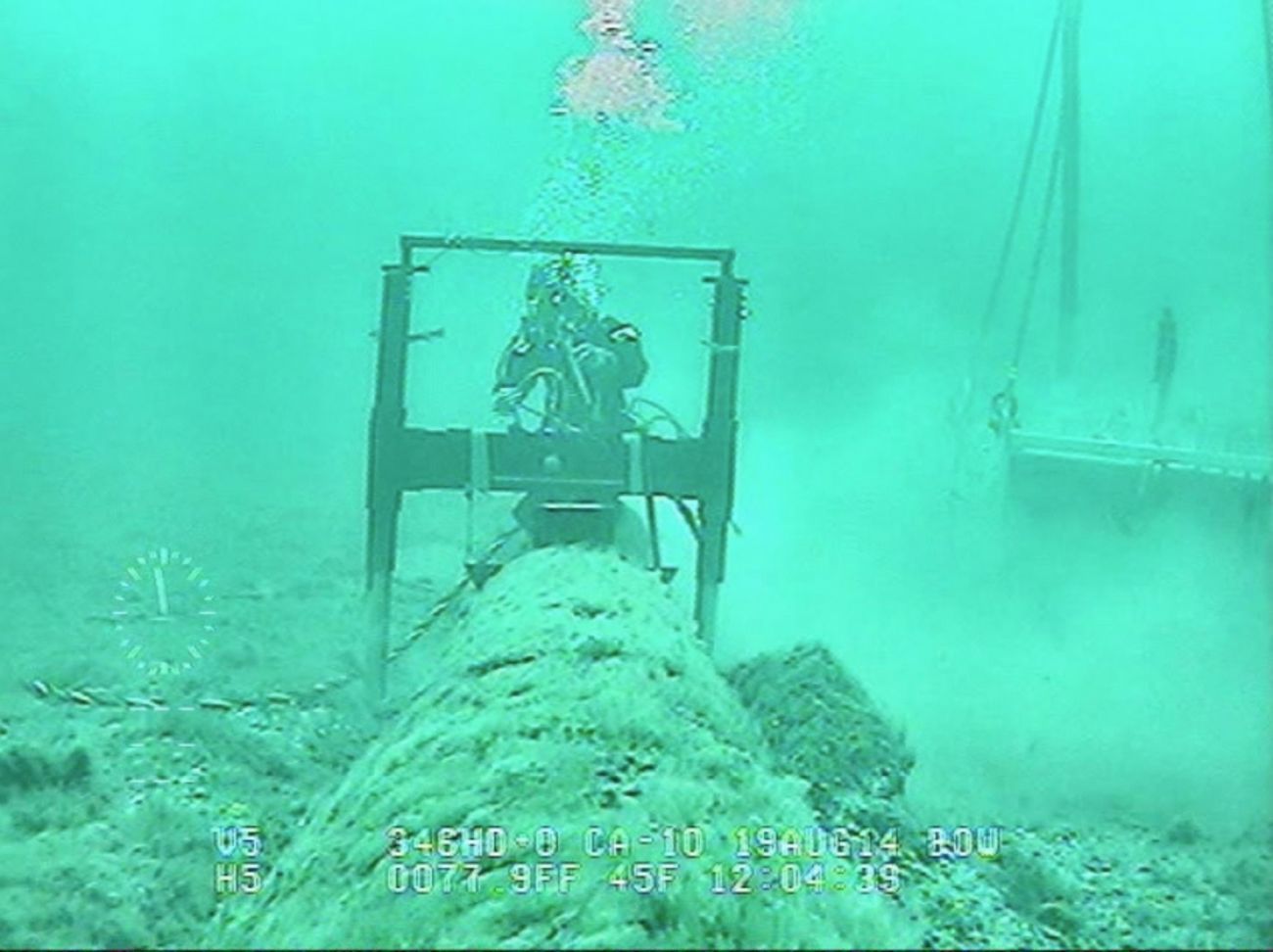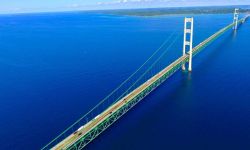With lawsuits stalled in Michigan, Nessel seeks Line 5 shutdown in Wisconsin

- A Wisconsin tribe wants a judge to shut down Line 5, citing fears of a rupture in the Bad River
- Nessel on Wednesday threw her support behind the tribe’s effort
- Pipeline owner Enbridge Energy contends the pipeline is safe
After so far failing to win a legal judgment shutting down the Line 5 petroleum pipeline in Michigan, Attorney General Dana Nessel is lending her voice to a shutdown effort in Wisconsin.
Nessel on Wednesday filed an amicus brief supporting the Wisconsin-based Bad River Band of the Lake Superior Tribe of Chippewa Indians of the Bad River Reservation, which last week asked a federal court in Wisconsin for an emergency shutdown after spring flooding eroded a riverbank near the pipeline on tribal land miles from Lake Superior.
This article is part of The Great Lakes News Collaborative, which includes Bridge Michigan, Circle of Blue, Great Lakes Now at Detroit Public Television, and Michigan Radio. It unites newsroom resources to report on the most pressing threats to the Great Lakes and drinking water supplies, including pollution, climate change, and aging infrastructure. The independent journalism is supported by the Charles Stewart Mott Foundation.
In the amicus brief (a term for a brief submitted by someone who isn’t party to a case but often has a stake in its outcome) before the U.S. District Court for the Western District of Wisconsin, Nessel asked judges to “consider the People of the State of Michigan and others who will be irreparably harmed by a release of Enbridge’s oil into Lake Superior.”
Related:
- Enbridge Line 5 tunnel project in Michigan delayed another 1.5 years
- Why Line 5 will likely remain open despite Democratic control of Lansing
- Regulators: No Enbridge Line 5 tunnel decision without more safety info
“As Attorney General, I owe a duty to the people of Michigan to protect all of Michigan’s waters, not only for us today, but also for future generations,” she said in a written statement Wednesday. “I will always do everything in my power to protect the Great Lakes from the threat posed by those who care more about their bottom line than about Michigan’s residents and natural resources.”
The pipeline’s owner, Canadian oil giant Enbridge Energy, fired back.
In a statement, Enbridge spokesperson Ryan Duffy warned of “severe consequences for people and industries in both the U.S. and Canada” should oil stop flowing through the pipeline, which transports up to 540,000 barrels of petroleum daily. The company also contended a shutdown would violate a treaty between the U.S. and Canada that governs the flow of cross-border pipelines.
“The pipe is not exposed, it is completely covered by multiple feet of soil; there is no pipeline safety issue, no emergency, and no reason to shut down Line 5,” Duffy said in an email.
Like Nessel and Gov. Gretchen Whitmer, the Bad River Band has been sparring for years with Enbridge over the pipeline, which begins in Wisconsin and passes through the tribe’s land before crossing both Michigan peninsulas and ending in Canada. A judge last year concluded that Enbridge was trespassing on the Bad River Band’s land in Wisconsin, but declined to order an immediate shutdown.
Then came spring floods, which the Bad River Band’s lawyers say have eroded the Bad River near Superior, Wisconsin with “alarming rapidity.” The riverbank has moved by more than 10 feet in one location, leaving the pipeline 11 feet from the river.
“A rupture of Line 5 at the Bad River meander poses a catastrophic threat to the public,” the tribe’s lawyers wrote in a May 9 filing to U.S. District Court Judge William Conley.
Tribal officials say they fear further erosion would expose the pipe to the river, where rushing water and debris could cause catastrophic failure and send oil into nearby Lake Superior. The band has refused Enbridge’s proposal to reinforce the river bank against erosion, arguing instead the pipeline should be shut down.
Line 5’s safety against a rupture has been subject of heated political debate in the Great Lakes for years, ever since the company’s Line 6B pipeline ruptured near Kalamazoo in 2010, spilling more than 840,000 gallons of oil into the Kalamazoo River.
Opponents to Line 5 in Michigan say they fear even more catastrophic consequences if the 70-year-old pipeline were to rupture in the Straits of Mackinac. There, a 4-mile stretch of Line 5 sits exposed on the lakebed.
Enbridge struck a deal with then-Gov. Rick Snyder in 2018 to address the spill risk by relocating the pipe in an underground tunnel beneath the lakebed. But construction on the tunnel project, which Enbridge promised to complete by 2024, has yet to start.
Enbridge is still awaiting several key state and federal permits, and construction is not expected to begin until at least 2026, if at all.
Whitmer and Nessel came into office on a promise to shut down Line 5, but so far have not prevailed.
Gov. Whitmer in 2020 ordered Enbridge to shut down the Straits portion of the pipeline, but Enbridge ignored the order and sued Michigan in federal court, alleging the state lacked jurisdiction to order a shutdown. Whitmer’s lawyers have asked the court to dismiss the suit.
Nessel and Enbridge, meanwhile, are pursuing dueling lawsuits over Michigan’s effort to shut down the pipelines. A judge has yet to issue a final decision on whether a shutdown case filed by Nessel should be heard in federal court. In general, legal scholars have said, Nessel is more likely to prevail if the case is heard in state court, while Enbridge is more likely to prevail in federal court.
Michigan Environment Watch
Michigan Environment Watch examines how public policy, industry, and other factors interact with the state’s trove of natural resources.
- See full coverage
- Subscribe
- Share tips and questions with Bridge environment reporter Kelly House
Michigan Environment Watch is made possible by generous financial support from:
Our generous Environment Watch underwriters encourage Bridge Michigan readers to also support civic journalism by becoming Bridge members. Please consider joining today.
See what new members are saying about why they donated to Bridge Michigan:
- “In order for this information to be accurate and unbiased it must be underwritten by its readers, not by special interests.” - Larry S.
- “Not many other media sources report on the topics Bridge does.” - Susan B.
- “Your journalism is outstanding and rare these days.” - Mark S.
If you want to ensure the future of nonpartisan, nonprofit Michigan journalism, please become a member today. You, too, will be asked why you donated and maybe we'll feature your quote next time!






